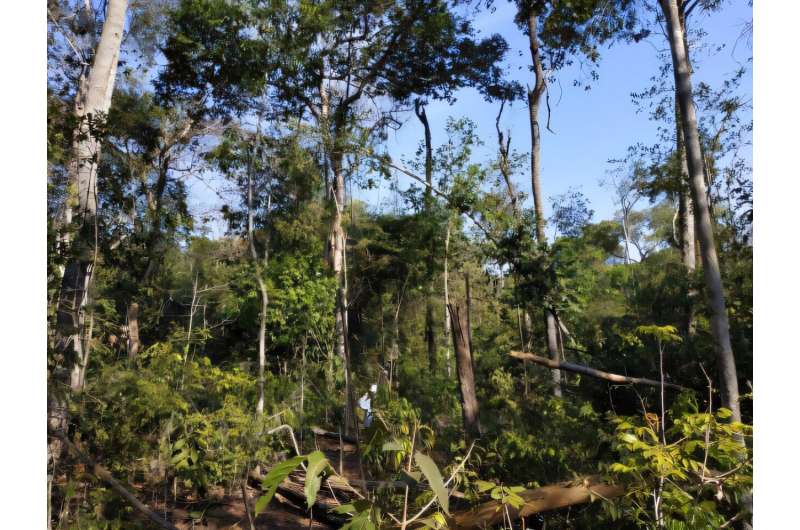Frequent forest fires and agricultural expansion are degrading soil health in the southern Brazilian Amazon. This results in lasting damage to carbon (C) and nitrogen (N) stocks, as well as to the overall functionality of ecosystem soils. These findings are presented in a study conducted by researchers from Brazil, the United States, and the United Kingdom at the Tanguro Research Station, located in the transition zone between the Amazon Rainforest and the Cerrado (the Brazilian savanna-like biome), in the Amazonian Arc of Deforestation.
"We're talking about a fire that isn't natural. In the Arc of Deforestation, record fires result from a combination of agricultural and livestock expansion, degradation of neighboring native forests, and prolonged droughts caused by climate change—all promoted by human action," says researcher Mário Lucas Medeiros Naval, the lead author of the study.
"Our work shows how these successive fires have a long-term impact on organic matter and other essential soil attributes and how this compares to agriculture in the region," he comments.
The study, published in the journal CATENA, analyzed the effects of forest conversion to agriculture and the frequency of burning on soil organic matter, as well as various physical and chemical indicators of soil health. The researchers compared four scenarios: an intact forest, a forest burned annually, a forest burned every three years, and an area converted to agriculture under a no-till system with crop rotation.
"Our results show a 17% decrease in soil carbon stocks with annual burning, 19% with triennial burning, and 38% with agricultural conversion," says Naval. "Even when agriculture adopts good practices, such as crop rotation and cover crops, it still generates more severe soil carbon losses than fire in native forests."
The researcher explains that the area studied is a transition forest similar to the "Cerradão" (a biodiversity-poor forest formation), with trees averaging 20 meters in height. "It isn't as tall as the forest in the center of the Amazon, but it's also not Cerrado sensu stricto. And it's precisely in this region that the agricultural frontier has advanced the most, mainly with soybeans," he says.
The research was conducted in a 150-hectare experimental area managed by the Amazon Environmental Research Institute (IPAM) within the legal reserve of a private property where the Tanguro Research Station is located. "We had access to a large area with 50 hectares for each treatment type, enabling us to obtain a representative sample," the researcher points out.
"An important aspect of the study is that we evaluated the soils nine years after the last burn. Even with the forest's recovery time, carbon and nitrogen stocks were still significantly reduced," he adds.
According to Naval, these losses compromise essential properties given the multiple benefits of organic matter for various soil health indicators. "For example, our results show that by reducing carbon stocks, much of the cation exchange capacity [CEC, one of the ways of measuring the nutrient retention capacity of the soil] is lost," explains the researcher.
Thus, the study also revealed impacts on other physical and chemical indicators, demonstrating broader soil health degradation.
The research showed that the loss of total carbon—the sum of the carbon stored in above-ground biomass and in the soil—reached 33% with annual burning and 48% with triennial burning. "This shows that, from the point of view of the ecosystem as a whole, fire frequencies have a differentiated impact, even though the statistical difference between the two regimes wasn't significant in the soil," he explains.
"Unlike the Cerrado, where fire is natural to the ecosystem and plays an ecological role, in the Amazon we're talking about an element that's exogenous and induced by changes in land use, not natural burning. Burning the Amazon rainforest means interfering with an environment that isn't adapted to fire," Naval summarizes.
The authors recommend adopting policies that contain the agricultural frontier, prevent forest fires, and implement more biodiverse agricultural systems, such as agroforestry. They argue that these practices store significant amounts of carbon, which is crucial for global climate stability, and maintain the health of Amazonian soils.
"The search for alternatives to the conventional agricultural production model is essential not only for environmental preservation, by preventing new fires, but also to ensure food security for the population," explains researcher Plínio Barbosa de Camargo, one of the study's coordinators.
The work is part of the international Amazon PyroCarbon project. The initiative, which is coordinated by Camargo and Ted Feldpausch from the University of Exeter, studies the impacts of fire in different regions of the Amazon.
"This work at the Tanguro Research Station is only part of a broader initiative that's mapping how fire affects Amazonian soils at various points in the biome," says Naval, currently a master's student at the Center for Nuclear Energy in Agriculture (CENA-USP).
Source - https://phys.org













